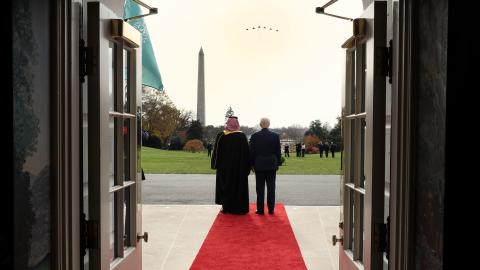A Wall Street Journal article published on Jan. 4 with the title "China Takes Aim at U.S. Naval Might" warned of China's overall strategy of denying the U.S. access to the Western Pacific and the specific threat of its anti-ship ballistic missile, the DF-21D, which is designed to hit a large ship - for example, an aircraft carrier - under way at a distance of at least 1000 miles. The Journal's article preceded by one day President Obama's announcement that as America's wars in the Middle East conclude, "we will focus on a broader range of challenges and opportunities, including the security and prosperity of the Asia Pacific."
Earlier in the same statement Mr. Obama both acknowledged the criticisms of his political opponents insisting that "we must put our fiscal house in order here at home and renew our long-term economic strength," and anticipated his rivals' more robust support for defense expenditures declaring that Congress had - by default- mandated "reductions in ... defense spending."
Whatever the attractions of decreased defense expenses are to Mr. Obama's political base, addressing his opponents' concern about the U.S.'s increasing indebtedness through defense cuts is unlikely to succeed strategically or economically. The combination of defense cuts that the administration has so far executed plus those it proposes, when added to the amounts which may be sequestered if Congress fails to agree on cuts in entitlement programs, will cut the defense budget to less than 3 percent of GDP within a decade. At the end of the same period and excluding the more than $2 trillion dollar bill for Obamacare, the large entitlement programs - Medicare, Medicaid, and Social Security - will consume about 3.7 times as large a percentage of GDP as defense.
Defense expenditures are neither the cause of exponentially accelerating national indebtedness nor is slashing them a solution. Indeed today's political debate recapitulates a similar one that took place in England in the late 19th century. That embodiment of Victorian financial rectitude, Sir Edward Hamilton, a Treasury official under Prime Minister Lord Salisbury, reminded the Cabinet in 1895 of large increases in the national budget that had already occurred and "formidable" ones in the foreseeable future. The causes Sir Edward stated were "Some of the services which the State has undertaken are in their nature services of automatic growth, notably educational services; while the tendency of responsible as well as irresponsible persons is to saddle the State with further undertakings which must be accompanied with heavy cost to the taxpayer."
British political leadership foresaw the rise of entitlement programs to which they conceived no other response than to raise revenue. Nevertheless deficits mounted. The cost of the irregular Boer War at the turn of the century amounted to twice the highest estimates. Still, Treasury officials informed Commons that the real financial predicament was the growing cost of what had by then come to be accepted as "ordinary expenses." The government piled on additional taxes and duties but spending continued to rise at a rate that the political culture of the day found intolerable.
Comparisons to our own times shatter here because of today's divided opinions over how much debt is tolerable. But the U.S. and the U.K.'s predicaments converge in their willingness to accept risks to their security. A decade before the beginning of World War I Britain decided that neither Japan nor the U.S. would become a threat and, at the expense of their worldwide presence left the safety of distant seas to others and concentrated its strength in the European littoral. Britain's effective departure from Asian waters reduced the nation's responsibilities and some of its costs. It also increased the risk to her security and commerce. In doing so it prepared the foundation for the eventual loss of Britain's predominant seapower, the end of the Empire, and her descent from the status of a great power.
The Obama administration's strategic shift announced on Jan. 5 also demonstrates greater attention to domestic politics than to the possibilities of foreign danger. "Sustaining U.S. Global Leadership" follows the Obama administration's preference for cooperative, coalition, and non-military approaches "to address instability and reduce the demand for significant U.S. force commitments to stability operations." This isn't even a search for "exit strategies" first in the face of a crisis. It's an explicit declaration of intent to leave leadership to others whenever and wherever possible.
For Asia, the document is more implicit. The Obama administration favors continuing "to make the necessary investments to ensure that we maintain regional access and the ability to operate freely in keeping with our treaty obligations and with international law." "Sustaining U.S. Global Leadership" states that "the growth of China's military power must be accompanied by greater clarity of its strategic intentions."
But can a state announce its strategic intentions more clearly than China already has with the development of a missile system intended to deny access to the U.S. Navy which has acted as the region's most effective force for peace since before World War II? Is more evidence required than China has already supplied of its intent to bully nations in the region with which it has disputes in Asian waters such as Vietnam, Japan, and the Philippines? The Obama administration's problem is that whatever it means by retaining U.S. influence in the region achieving this is very much in doubt as a result of the cuts in defense that Mr. Obama has already made, those that are in store, and those that could come because of sequestration.
Defending against China's anti-ship ballistic missile, for example, means improving U.S. defenses against such missiles or building drones that can reach the Asian mainland from beyond the range of China's anti-ship ballistic missile or constructing smaller more numerous aircraft carriers which would be more difficult targets or combining naval aircraft at sea and air forces stationed at a large number of well-defended land bases in the region thus vastly complicating China's ability to deny U.S. forces regional access. With the prospect of a trillion-dollar cut in the U.S. defense budget over the next decade, where will the money for any of these access-preserving measures come?
A strategic shift is in order following the conclusion of America's wars in the Middle East. The administration is correct to increase its attention to preserving a balance of power in Asia. And the question of sustained U.S. global leadership is very much at stake. It cannot be preserved by leaving such leadership to others or by radical cuts in the U.S. military such as the Obama administration is willing to accept.
At the beginning of the previous century the British risked less by withdrawing from the Pacific because the U.S.- whose views of international order paralleled the U.K. - was ready to step into its place. If massive defense reductions damage irreparably America's position in the Western Pacific, it will likely be replaced by China. This will not sustain U.S. global leadership regionally or globally. Nor will it advance the interest of Asia's other states in defending their sovereignty, independence of action, and liberty.
















